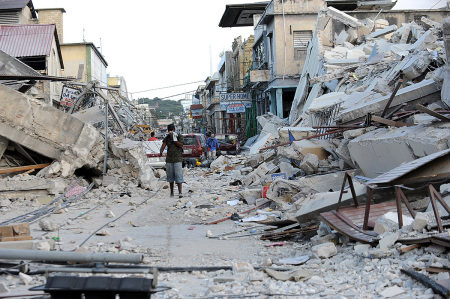Massive 7.2 magnitude earthquake hits Haiti; over 200 killed, thousands feared dead

Over 200 people have been found dead and that number is expected to rise after a magnitude 7.2 earthquake that struck western Haiti on Saturday reduced buildings to rubble. Many fear thousands might have been killed.
Haiti’s Office of Civil Protection, which manages disaster relief, said Saturday evening that at least 229 people have died. The U.S. Geological Survey warned residents to expect "high casualties" with the possibility that fatalities could reach into the thousands.
The earthquake, which occurred around 8:30 a.m. local time, struck about 5 miles from the town of Petit Trou de Nippes, which is 93 miles west of the capital Port-au-Prince, and was felt across the Caribbean. It was followed by a series of aftershocks, according to the USGS said.
A civil protection coordinating organization said the death toll was at least 225 people. said the death toll was at least 225 people.
The USGS issued a series of alerts Saturday:
- Red alert for shaking-related fatalities. High casualties are probable and the disaster is likely widespread. Past events with this alert level have required a national or international level response.
- Orange alert for economic losses. Significant damage is likely. Estimated economic losses are 0-3% GDP of Haiti.
- Overall, the population in this region resides in structures that are vulnerable to earthquake shaking, though resistant structures exist. The predominant vulnerable building types are mud wall and adobe block construction.
- Recent earthquakes in this area have caused secondary hazards such as landslides that might have contributed to losses.
Franklin Graham, president of Samaritan’s Purse, told Fox News Saturday that the humanitarian aid organization will be going to Haiti to provide water filtration units, tents and medical supplies.
In a post on Facebook, Graham added: "Samaritan's Purse is deploying disaster response team members and airlifting emergency relief supplies including shelter material and two community water filtration units. We are also sending a medical team to help provide basic medical care. Pray for our teams as they deploy, and pray especially for this country in the wake of another devastating disaster."
MANY COLLAPSED BUILDINGS & Homes Per Reports, First Pictures Of Haiti M7.6 Quake Damage 08/14/2021 pic.twitter.com/a3iUoXGFVR
— AwareMap (@AwareMap) August 14, 2021
A tsunami wave warning that had been issued was lifted by the afternoon, according to the U.S. Tsunami Warning System.
Residents of the coastal town of Les Cayes said water had briefly flooded the area, which led some to fear a tsunami was imminent. Some locals had fled into the mountains for safety in preparation for a potential tsunami, local media outlets reported, Reuters reported.
Saturday's earthquake hit farther away from the capital Port-au-Prince than the catastrophic 7.1 magnitude earthquake in 2010 that killed an estimated 300,000 people and left between 1.5 million and 2 million homeless.
The earthquake "was strongly felt but did not appear to have caused major damage," Reuters reported Saturday afternoon.
Haiti is now in the path of Tropical Storm Grace which could bring heavy rains in the coming days.
The island nation was already struggling with political and ongoing humanitarian crises before the earthquake hit.
On July 7, Haitian President Jovenel Moïse was assassinated, allegedly by a group of some 28 foreign mercenaries.
Prior to his assassination, there had been calls for Moïse to step down, including from the Bishops' Conference of Haiti, amid a dispute over when his five-year term should end and concerns that his push for constitutional changes that would grant Haiti’s leader immunity for any actions taken while in office would lead to authoritarian rule and threaten the nation's democracy.
During his presidency, many raised concern about his connections to criminal gangs and used that power to repress political opponents, according to the U.S. government. Last year, the U.S. Treasury sanctioned two senior Haitian officials for allegedly planning the 2018 La Saline massacre," The Wall Street Journal reported.
In that massacre, civilians, including children, were taken from their homes and executed in the streets. Their bodies were then burned and dismembered, the U.S. Treasury said.
In 2019, Haitians took to the streets to demand Moïse resign in light of allegations that the government misappropriated billions of dollars earmarked for reconstruction following the 2010 earthquake.
The country was struck by another natural disaster in 2016 from Hurricane Matthew that killed hundreds and causing widespread devastation.
With a Gross Domestic Product per capita of $1,149.50 and a Human Development Index ranking of 170 out of 189 countries in 2020, Haiti's economic and social development is hindered by political instability, governance issues and fragility, according to the World Bank. Haiti is the poorest country in the Latin America and Caribbean region and among the poorest countries in the world.





















